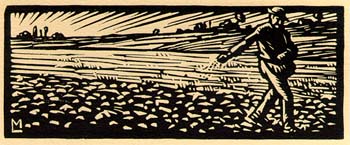


 HE entire work of him who so loved humanity will remain the clear source of
light, the hearth of intense warmth toward which the readers of the rising
generation will come in multitudes to draw new power and new ardour. I do
not believe that in all our Celto-Latin literature there exists works so
fitting to elevate the spirit, purify the taste, regulate the play of all
the faculties, lift the heart of man above the meannesses and egoism of the
present time. Nothing is so beautiful with the simple and serene beauty of
the great landscapes of virgin nature as these pages so complete that one
can neither add to nor abridge from their integrity. The crystal purity of
the style whose always even delivery flows like a limpid and joyous wave,
the harmonious rhythm of all these phrases so well connected, all meeting to
illustrate the logical deduction whereof their edifice will finally be
crowned, these new expressions spontaneously springing from subject and
idea, which are so many happy gifts added to our language, these striking
images which here and there illumine the text and impress our spirit with
their great majesty, this supreme perfection of detail as of ensemble which in time to come will guarantee the
duration of that solid and stable architeclure, this large comprehension of
nature and of life, of the cycle of peoples and the evolution of societies,
above all, this sympathy, this ardour, this youth which reigns in all the
pages of Elisée Reclus, this indefatigable perseverance which permits him to
bring to a happy conclusion a colossal enterprise, claiming more than half a
century of effort and research, all these admirable qualities united render
this unique writer a savant, a thinker, an artist, a poet, an educator, and
whatever one may say besides, a man of action of the first rank.
HE entire work of him who so loved humanity will remain the clear source of
light, the hearth of intense warmth toward which the readers of the rising
generation will come in multitudes to draw new power and new ardour. I do
not believe that in all our Celto-Latin literature there exists works so
fitting to elevate the spirit, purify the taste, regulate the play of all
the faculties, lift the heart of man above the meannesses and egoism of the
present time. Nothing is so beautiful with the simple and serene beauty of
the great landscapes of virgin nature as these pages so complete that one
can neither add to nor abridge from their integrity. The crystal purity of
the style whose always even delivery flows like a limpid and joyous wave,
the harmonious rhythm of all these phrases so well connected, all meeting to
illustrate the logical deduction whereof their edifice will finally be
crowned, these new expressions spontaneously springing from subject and
idea, which are so many happy gifts added to our language, these striking
images which here and there illumine the text and impress our spirit with
their great majesty, this supreme perfection of detail as of ensemble which in time to come will guarantee the
duration of that solid and stable architeclure, this large comprehension of
nature and of life, of the cycle of peoples and the evolution of societies,
above all, this sympathy, this ardour, this youth which reigns in all the
pages of Elisée Reclus, this indefatigable perseverance which permits him to
bring to a happy conclusion a colossal enterprise, claiming more than half a
century of effort and research, all these admirable qualities united render
this unique writer a savant, a thinker, an artist, a poet, an educator, and
whatever one may say besides, a man of action of the first rank.![]()
Compare for an instant a fragment of this unparalleled work with any one
page whatsoever, of any one of our most famous contemporary authors. Will
you not readily find in the latter many a retouch to produce style, many a
gap and a superfluity, a rank growth of evil and parasitical weeds, which
the writer has not had the good taste to extirpate in time, a certain
clumsiness in the juxtaposition of phrases, these stones for the intellect,
here and there some false ideas which spoil the best chapters. Read and
re-read the sublime descriptions of the terrestrial phenomena, the pages of
ethnography, so well documented, of his great geographical encyclopaedia,
and especially these innumerable articles of reviews and journals, ideas
from which, through his aversion for all dogmas and despostisms, spring his
ardent desire for a free and fraternal humanity. Regard, study slowly, this
prodigious pagan movement patiently built up in honor of Man and of his
Planet. Satisfy your soul, athirst to know the world, at this great stream
of science, marvel of marvels, which quite boiling with heroism at its
heart, always gains in amplitude and in noble tranquility as it nears its
source.![]()
And tell me, finally, if you do not feel, improved, transfigured, more
human, more generous, better equipped for the task of broadcasting ideas, of
communicator of enthusiasm, the task which you have assumed.![]()
A. PRATELLE
"L' ÉCOLE RÉNOVEÉ", October, 25,1908.
